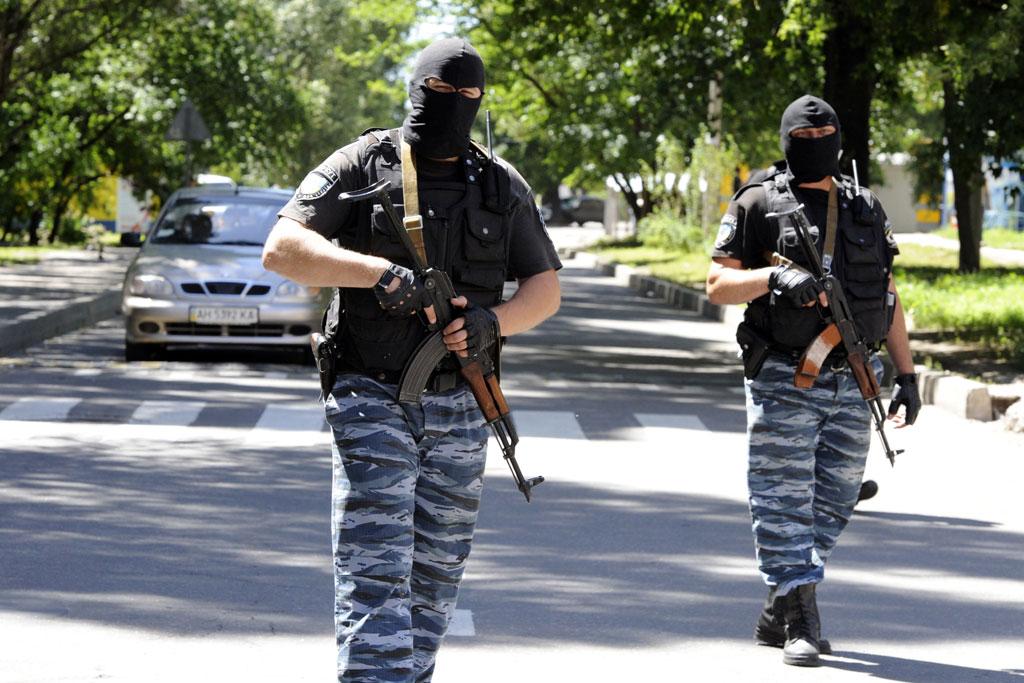Ukrainian forces attack separatist bases in the east
Masked armed men wearing uniforms with the emblem of the Berkut, Ukraine’s disbanded elite riot police force, block the road near the police station in the center of the eastern Ukrainian city of Donetsk on July 1, 2014.
Ukrainian forces struck at pro-Russian separatist bases in eastern regions with air and artillery strikes on Tuesday after President Petro Poroshenko announced he would not renew a ceasefire but go on the offensive to rid Ukraine of "parasites."
His decision quickly drew fire from Russian President Vladimir Putin who said Poroshenko had disregarded the advice of himself and German and French leaders. Putin said Poroshenko would now have to bear full responsibility for veering off the road to peace.
Repeating a threat he made in March when Russia annexed Crimea, Putin said Moscow would continue to defend the interests of ethnic Russians abroad — up to three million of whom live in the east of Ukraine which has been in separatist ferment since April.
Within hours of Poroshenko's early morning announcement, his military went into action against rebel bases and checkpoints, bombarding them from the air and with artillery.
"The terrorists' plan to significantly escalate armed confrontation has been disrupted and the threat of losses to the civilian population and service personnel has been liquidated," the defence ministry said.
There was no immediate word on casualties.
Poroshenko, who accuses Russia of fanning the conflict and allowing fighters and equipment to cross the border to support the rebels, turned his back on another renewal of a 10-day unilateral ceasefire after the phone talks involving Putin, German Chancellor Angela Merkel and France's Francois Hollande.
Showing impatience at what he had heard from Putin, Poroshenko said in his early morning statement that Ukraine had not seen "concrete steps for de-escalating the situation, including strengthening controls on the border."
Poroshenko, just over three weeks in office, faces a possible popular backlash at home over military losses during the ceasefire and was under pressure to switch to more forceful action against the rebels.
'Militants and marauders'
Many of his security advisers told him that the rebels had used the June 20 ceasefire, renewed for three days on June 27, to regroup and rearm. A statement tweeted by the Ukrainian foreign ministry on Monday as Poroshenko went into talks with his security chiefs said 27 Ukrainian servicemen had been killed and 69 wounded since the start of the ceasefire.
Announcing the military would now act to answer the "terrorists, militants and marauders," Poroshenko accused the rebels of failing to keep to the truce or follow a peace plan he had outlined. Later on his Facebook page, the 48-year-old leader warned the future would be difficult, adding: "we must be united, because we are fighting to free our land from dirt and parasites."
Putin bluntly suggested Poroshenko had been isolated in Monday's phone-in with himself, Merkel and Hollande.
"Unfortunately President Poroshenko took the decision to restart military operations and we — I mean myself and my European colleagues — could not convince him that the road to stable, strong and long-lasting peace does not lie through war," he said.
"Up until now (Poroshenko) was not directly linked to the order to start military operations but now he has taken on this responsibility fully, not only militarily but also politically," he said.
It was not immediately known whether Berlin and Paris agreed with this version of Monday's discussions.
Earlier in Moscow, before Putin spoke, the Russian foreign ministry hinted that the United States stood behind Poroshenko's decision. "There is an impression that the change in Kyiv's position … could not have come about without influence from abroad, despite the position of leading EU member states," it said in a statement.
Every day, reporters and producers at The World are hard at work bringing you human-centered news from across the globe. But we can’t do it without you. We need your support to ensure we can continue this work for another year.
Make a gift today, and you’ll help us unlock a matching gift of $67,000!
